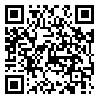Wed, Jul 16, 2025
[Archive]
Volume 10, Issue 1 (2-2024)
jhehp 2024, 10(1): 24-32 |
Back to browse issues page
Download citation:
BibTeX | RIS | EndNote | Medlars | ProCite | Reference Manager | RefWorks
Send citation to:



BibTeX | RIS | EndNote | Medlars | ProCite | Reference Manager | RefWorks
Send citation to:
Afifirad Z, Khorshidi G, Soori T. The Grounded Theory of Consumer Discipline through Others: A Case Study of Type 2 Diabetic Patients. jhehp 2024; 10 (1) :24-32
URL: http://jhehp.zums.ac.ir/article-1-617-en.html
URL: http://jhehp.zums.ac.ir/article-1-617-en.html
1- Department of Business Management, Faculty of Management and Accounting, Shahid Beheshti University, Tehran, Iran.
2- Department of Infectious Diseases, Razi Hospital, Tehran University of Medical Sciences, Tehran, Iran.
2- Department of Infectious Diseases, Razi Hospital, Tehran University of Medical Sciences, Tehran, Iran.
Abstract: (1443 Views)
Background: This study investigates consumer behavior in chronic disease management, specifically type 2 diabetes. Adherence to disciplined disease management is critical for individuals affected by this condition. We explore how patient attitudes and behaviors are influenced by their environment and resources, including family support, medical guidance, emotions, habits, and self-efficacy. This research aims to provide insights into promoting discipline and positive behaviors in consumers managing lifelong chronic illness.
Methods: To achieve our research objectives, we employed a Glaserian grounded theory approach and conducted semi-structured interviews with 13 patients diagnosed with type 2 diabetes, as well as their family members. Theoretical sampling was used to elucidate the role of social interactions in influencing adherence.
Results: The analysis of the collected data yielded three core categories that represent the spectrum of consumer discipline: indiscipline, disrupted discipline, and absolute discipline. The section on disrupted discipline highlights how disruptions in patients’ interactions with their families and healthcare professionals impact their discipline.
Conclusion: Consumer discipline involves a dynamic interplay between the individual and their immediate environment. This study examines the influence of familial and medical support as key mediating factors in shaping consumer health behavior. Drawing on cognitive and emotional capacities, habits, and self-efficacy, consumer disciplinary practices are shaped through a diverse range of personal and social resources. By recognizing the intermediary roles of family members and healthcare providers, policymakers can gain valuable insights to inform efforts aimed at enhancing self-discipline and ultimately improving public health outcomes.
Methods: To achieve our research objectives, we employed a Glaserian grounded theory approach and conducted semi-structured interviews with 13 patients diagnosed with type 2 diabetes, as well as their family members. Theoretical sampling was used to elucidate the role of social interactions in influencing adherence.
Results: The analysis of the collected data yielded three core categories that represent the spectrum of consumer discipline: indiscipline, disrupted discipline, and absolute discipline. The section on disrupted discipline highlights how disruptions in patients’ interactions with their families and healthcare professionals impact their discipline.
Conclusion: Consumer discipline involves a dynamic interplay between the individual and their immediate environment. This study examines the influence of familial and medical support as key mediating factors in shaping consumer health behavior. Drawing on cognitive and emotional capacities, habits, and self-efficacy, consumer disciplinary practices are shaped through a diverse range of personal and social resources. By recognizing the intermediary roles of family members and healthcare providers, policymakers can gain valuable insights to inform efforts aimed at enhancing self-discipline and ultimately improving public health outcomes.
Keywords: Consumer discipline, Diabetes, Grounded theory, Interpersonal relations, Patient adherence
Type of Study: Original Article |
Subject:
Public Health
Received: 2023/12/16 | Accepted: 2024/01/23 | Published: 2024/02/7
Received: 2023/12/16 | Accepted: 2024/01/23 | Published: 2024/02/7
References
1. Cronin JM, McCarthy M, Delaney M. Deconstructing Consumer Discipline: How Self-management is Experienced in the Marketplace. Eur J Mark. 2015; 49(11/12): 1902-22. [Crossref] [Google Scholar]
2. Loskutova NY, Tsai AG, Callen E, Ajayi K, Carroll JK, Harrington M, et al. Differences in Perspectives regarding Diabetes Management between Health Care Providers and Patients. Transl Behav Med. 2018; 8(3): 328-40. [Crossref] [Google Scholar]
3. Larijani B, Farzadfar F, Esfahani E, Naderimagham S, Peykari N, Sharghi S, et al. National Service Framework for Diabetes. 2017.
4. Zavvarkabeh R, Mohammadzadeh R, Jabbari Bayrami H. Association of Body Mass Index and Risk of Diabetes and Hypertension in the Rural Women Aged over 30 Years in Saeidabad, East Azarbayjan, Iran. J Hum Environ Health Promot. 2018; 4(2): 94-8. [Crossref] [Google Scholar]
5. Roden M, Shulman GI. The Integrative Biology of Type 2 Diabetes. Nat. 2019; 576(7785): 51-60. [Crossref] [Google Scholar]
6. Ouschan R, Sweeney J, Johnson L. Customer Empowerment and Relationship Outcomes in Healthcare Consultations. Eur J Mark. 2006; 40(9/10): 1068-86. [Crossref] [Google Scholar]
7. Giovanna Vicarelli M, Bronzini M. From the ‘Expert Patient’ to ‘Expert Family’: A Feasibility Study on Family Learning for People with Long-term Conditions in Italy. Health Sociol Rev. 2009; 18(2): 182-93. [Crossref] [Google Scholar]
8. Bambra C, Gibson M, Sowden A, Wright K, Whitehead M, Petticrew M. Working for Health? Evidence from Systematic Reviews on the Effects on Health and Health Inequalities of Organisational Changes to the Psychosocial Work Environment. Prev Med. 2009; 48(5): 454-61. [Crossref] [Google Scholar]
9. Eagly AH, Chaiken S. The Psychology of Attitudes. Harcourt Brace Jovanovich College Publishers; 1993. [Google Scholar]
10. Goulding C. Grounded Theory. 2002; 1-186. [Crossref] [Google Scholar]
Send email to the article author
| Rights and permissions | |
 |
This work is licensed under a Creative Commons Attribution-NonCommercial 4.0 International License. |
© 2024 The Author(s)

.png)






